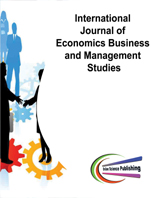A Neoclassical Approach to Behavioral Economics
DOI:
https://doi.org/10.20448/802.61.1.18Keywords:
Homoeconomicus, Neoclassical, Behavioral, Bounded rationality, Synthesis.Abstract
The objective of this paper is to show that the behavioral mission of modeling a human being as an agent driven by economic as well as psychological impulses can be accommodated to a large extent within the neoclassical framework which consists of optimizing agents arriving at equilibrium. First, it attempts to show that the non-homoeconomicus is as capable of ‘rationality’ as a homoeconomicus (self-centered human); in fact being self-centered has no major implications for the ability to be ‘rational’. Second, it shows that the systematic biases associated with neoclassical predictions of human behavior can be resolved in many cases by re-specifying the utility function to accommodate psychological factors. Thus, the contribution of the behavioral school would probably lie in altering the way in which neoclassical models are specified but not in rejecting the neoclassical methodology altogether. At the same time, it is pointed out in this paper that bounded rationality (satisficing behavior) of human beings in real life can often generate group behavior that is systematically different from predictions emerging from the neoclassical assumption of perfect rationality (optimizing agents).




